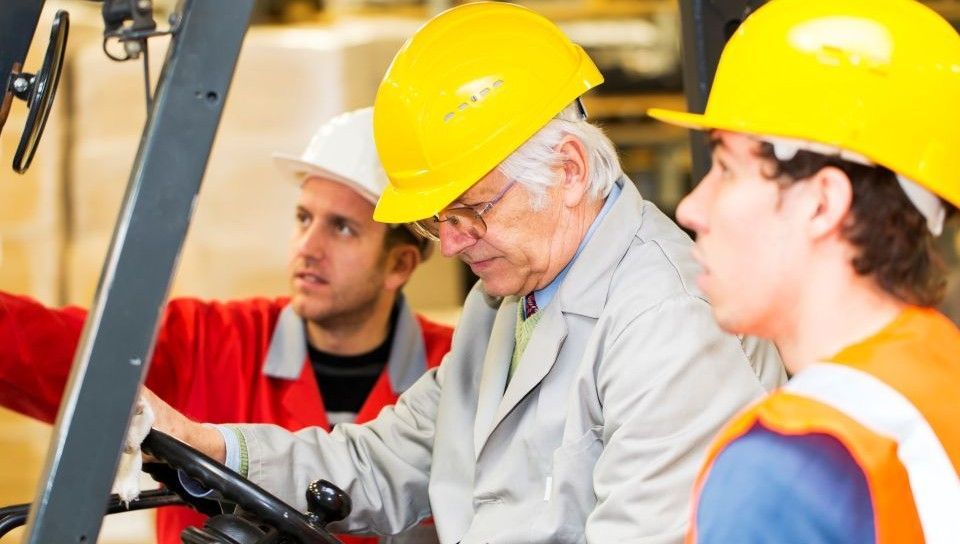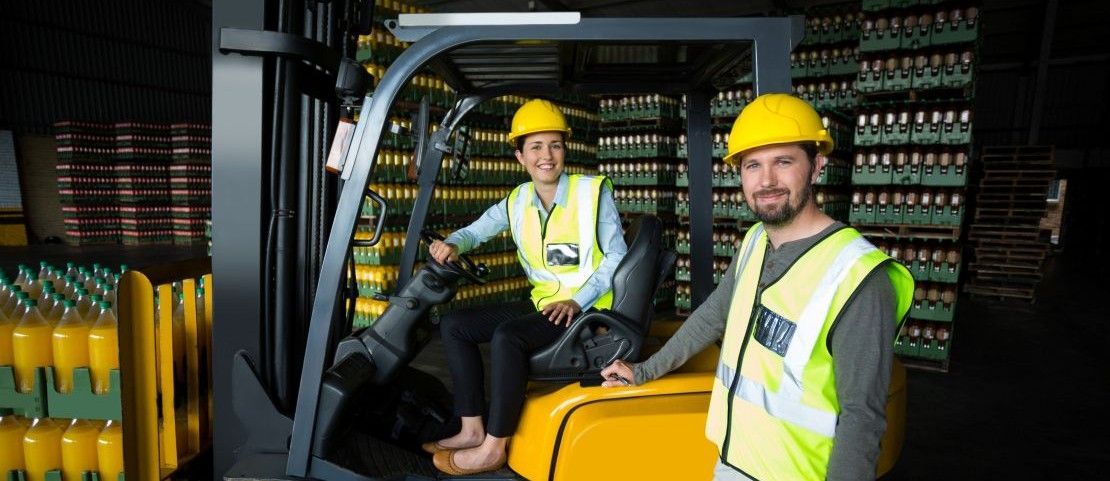What Licences and Training Do You Need to Operate a Hired Forklift?
Forklifts play a vital role in warehouses, construction sites, and logistics hubs, but they are also classified as high-risk equipment. Operating one without the correct licence and training isn’t just unsafe — it’s against the law. Whether you’re hiring a forklift for a short-term project or adding to your fleet, ensuring that operators are properly licensed is essential for workplace safety and legal compliance.
Below, our team breaks down the licences required to operate a forklift in Australia, the training process involved, and the key responsibilities for both operators and businesses before getting behind the controls of a hired forklift.

The Risks of Operating Without a Licence
Allowing an unlicensed operator behind the controls of a forklift can have serious consequences. Beyond the immediate safety hazards, businesses may also face legal and financial repercussions. Key risks include:
- Workplace Accidents
Without proper training, operators are more likely to make mistakes that result in injuries, damage to stock, or collisions with racking and equipment.
- Legal Penalties
Under Work Health and Safety (WHS) regulations, it is illegal to operate a forklift without a High Risk Work Licence (HRWL). Breaches can result in heavy fines for both the operator and the business.
- Insurance Issues
If an incident involves an unlicensed driver, insurance claims may be denied, leaving the company liable for damages and compensation costs.
- Operational Disruption
Mistakes caused by untrained operators can lead to damaged goods, machine downtime, and costly delays.
These risks make it clear why proper licensing and training are non-negotiable in any workplace that uses forklifts.
The Legal Requirements for Forklift Operators in Australia
In Australia, forklifts are classed as high-risk equipment, which means operators must hold the correct licence before they can legally use one.
These licences are issued under the Work Health and Safety (WHS) Regulations and are overseen by each state or territory’s safety authority, such as SafeWork NSW, WorkSafe Victoria, or WorkSafe WA, and include the following requirement.
- High Risk Work Licence (HRWL)
To operate a forklift, individuals must hold a valid High Risk Work Licence specific to forklift use.
- Minimum Age
Operators must be at least 18 years old to apply.
- Training and Assessment
Applicants must complete formal training through a Registered Training Organisation (RTO) and successfully pass both a written knowledge test and a practical skills assessment.
- Licence Validity
Forklift licences are generally valid for five years and must be renewed before expiry.
- State and Territory Oversight
While the rules are consistent nationally, each region administers licences through its own authority, so application processes may vary slightly.
Meeting these legal requirements ensures operators are not only trained but also recognised by regulators as competent to handle forklifts safely.

Types of Forklift Licences
Not all forklifts fall under the same licence category. In Australia, there are two main types of forklift licences, and the right one depends on the equipment being used.
LF Licence – Forklift Truck Licence
- Covers standard forklift trucks, including counterbalance forklifts and high reach models.
- This is the most common licence type in warehousing, logistics, and manufacturing.
- Required whenever an operator is lifting, carrying, or moving loads using a traditional forklift.
LO Licence – Order Picking Forklift Truck Licence
- Covers order-picking forklifts where the operator’s platform moves with the load.
- Common in warehouses and distribution centres that use stock pickers for filling customer orders from racking.
- Requires different handling skills compared to an LF forklift because the operator is raised with the load.
If your workplace uses both types of forklifts, operators may need to hold both an LF and LO licence to perform their roles legally.
Training Requirements for a Forklift Licence
Before applying for a forklift licence, operators must complete accredited training through a Registered Training Organisation (RTO). This ensures they have both the theoretical knowledge and practical skills needed to operate a forklift safely. The training process usually involves the following.
- Theory Training
Covers workplace safety, hazard awareness, load handling principles, and legal responsibilities under WHS regulations.
- Practical Training
Hands-on instruction using a forklift under supervision, focusing on manoeuvring, load handling, and safe operation in real workplace conditions.
- Formal Assessment
A combination of a written knowledge test and a practical driving test conducted by a certified assessor.
- Course Duration
Depending on the operator’s prior experience, training generally takes between two and five days.
- Nationally Recognised Unit
The standard course is TLILIC0003 – Licence to Operate a Forklift Truck, which is recognised across all Australian states and territories.
Completing this training not only allows operators to apply for their High Risk Work Licence but also builds the confidence and skills required for safe, efficient forklift use in the workplace.
Employer and Business Responsibilities
Licensing and training are not just the responsibility of forklift operators — businesses also have legal obligations under Australia’s Work Health and Safety (WHS) laws. When hiring or purchasing a forklift, employers must ensure their workplace remains compliant and safe. Key responsibilities include the following.
- Verifying Operator Licences
Employers must check that anyone operating a forklift holds a current and appropriate High Risk Work Licence (LF or LO).
- Providing Site-Specific Training
Even licensed operators may be unfamiliar with a particular workplace layout, equipment type, or safety procedures. Businesses are required to provide induction and site-specific training before work begins.
- Maintaining Safe Equipment
Forklifts must be properly maintained and inspected to meet safety standards. Unsafe equipment can expose employers to liability, even if the operator is licensed.
- Enforcing Safety Protocols
Employers have a duty of care to ensure operators follow safe work practices, including load limits, traffic management plans, and PPE requirements.
- Keeping Records
Records of licences, training, and maintenance should be kept up to date to demonstrate compliance during audits or inspections.
By meeting these obligations, businesses reduce risk, stay compliant with WHS regulations, and create a safer workplace for their team.
Penalties for Non-Compliance
Operating a forklift without the correct licence, or allowing an unlicensed operator to do so, can carry serious consequences in Australia.
Regulators treat this as a breach of Work Health and Safety (WHS) laws, and penalties can apply to both individuals and businesses. Some of the potential consequences include the following.
- Heavy Fines
Individuals operating without a licence, or employers who permit it, may face significant financial penalties. Fines can run into the thousands of dollars, depending on the severity of the breach.
- Legal Liability
If an accident occurs and the operator is unlicensed, both the operator and the employer may be held legally responsible for injuries, damage, or fatalities.
- Insurance Voidance
Many insurance policies will not cover incidents involving unlicensed operators. This can leave businesses fully liable for medical costs, repairs, and compensation claims.
- Reputational Damage
A workplace accident or legal breach can harm a company’s reputation with clients, employees, and regulators, making it harder to win future contracts.
The risks of non-compliance far outweigh the effort of ensuring all operators are properly trained and licensed.
How Forklift Hire Companies Support Compliance
Reputable forklift hire companies play an important role in helping businesses stay compliant with safety and licensing requirements. While the legal responsibility ultimately rests with the operator and employer, hire providers often have processes in place to reduce risks and support best practice. Ways forklift hire companies will assist include the following.
- Licence Verification
Providers may ask for proof of a valid High Risk Work Licence before releasing equipment. This ensures only qualified operators have access to hired forklifts.
- Safety Guidance
Hire companies supply manuals and may provide induction or refresher guidance on safe use, ensuring operators are aware of manufacturer recommendations.
- Equipment Maintenance
Forklifts are typically supplied in safe, compliant condition with regular servicing and inspections carried out. This helps businesses meet their WHS obligations.
- Advice on the Right Equipment
By recommending suitable forklifts for specific tasks, hire companies reduce the likelihood of accidents caused by using the wrong type of equipment.
Operating a forklift in Australia comes with strict licensing and training requirements — and for good reason. Forklifts are powerful machines that demand skill, knowledge, and compliance with WHS laws to ensure safety in the workplace. From obtaining the right licence (LF or LO), to completing accredited training, to meeting employer responsibilities, compliance is not optional — it’s essential.
At Heavy Lift Forklifts, we supply quality forklifts for hire (+ Transport in Melbourne) and new and used forklifts for sale, backed by expert advice to help you find the right equipment for your needs. Our team can guide you on licensing requirements and ensure you have safe, reliable machinery that meets your business goals.
Contact Heavy Lift Forklifts today to discuss your options and get the right solution — whether you’re hiring for flexibility or purchasing for the long term.
_________________
Heavy Lift Forklifts
Our showroom: 826 Mountain Hwy, Bayswater VIC
Call us on: (03) 9762 4965





